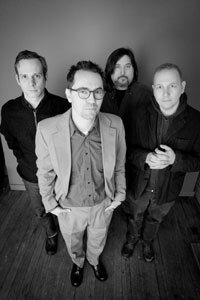INTERVIEW- Windy City wonder: Sea and Cake's frontman wows Chi-town

Publicity photo
Despite the weight of the second most awkward name in rock (after Les Claypool's Fearless Flying Frog Brigade), The Sea and Cake has lasted a decade in a fickle musical landscape that has felled many of their contemporaries. In May, they celebrated their 10-year anniversary with the release of Everybody, a 10-track collection of light, relatively friendly rock that once again established multi-talented renaissance frontman Sam Prekop as one of the darlings of Chicago music scene.
The Hook: You guys all have a ton of outside interests– side projects, comic books, and so on. How does that help or hurt the band?
Sam Prekop: I guess I'm compelled to do all those things. I went to art school and planned to make art, so I've felt like I'm an artist first, but the music has become my day job, so to speak. I feel like I'm fairly restless creatively, so if there's any down time, I pretty much come up with the next project. A lot of that started when [drummer] John McEntire started to get busy with Tortoise– I found myself with somewhat imposed time off from The Sea and Cake. That's when I started making solo records, and I ended up concentrating on them for a longer period of time than I expected.
The Hook: Does everyone have to drop everything else when it's time to work on The Sea and Cake?
Sam Prekop: We're actually hoping and planning to make a new record much sooner than later. I just hope I can say focused and not get distracted; I've consciously tried not to agree to other art projects, because I think another four years would be problematic.
The Hook: Why?
Sam Prekop: Just to take advantage of a certain momentum. There's no faking the experience of playing live and existing as a band.
The Hook: John has been doing a lot of production work recently– Spoon, the Fiery Furnaces, Kaki King, Antibalas, and even Bright Eyes. How has that affected the band?
Sam Prekop: Quite a bit. We consider our sound fairly self produced, but he has a very specific aesthetic that comes out. He didn't technically produce the last record, which was one way to change things up again, but I look forward to getting him back behind the board.
The Hook: What changed when you brought in Brian Paulsen as a producer? How did the band react to having an outside influence?
Sam Prekop: One thing we found useful was to have input from someone not in the band. He was really good at egging us on. [His style] and John's style don't diverge radically, but his aesthetic is more in line with capturing what it sounds like in real time, whereas John excels at post-production, manipulating after the fact, and coming up with ideas based on what else can happen in a processing sense. Brian is more about revealing accurately what happened.
The Hook: So how did that change your use of electronics?
Sam Prekop: We've always used electronics in some capacity, but The Fawn stands out because a lot of the songs were generated on keyboards. I felt like I had run out of ideas on guitar, and I was looking for some other way to generate material. But we've always used synthesizers in an overdubbed capacity, so there's quite a bit of electronic stuff in that way on this new record.
The Hook: The songs on it are very short. Why?
Sam Prekop: We just play them and get them to the point where they feel right. Of course, in the past we've been known to play songs for way too long– on our first record, every song is two to three minutes longer than we think it ought to be. Over the years, we've become conscious of not overstaying our welcome. A lot of the songs are fairly linear pattern-based workouts. It's easy to go on too long when you're droning out. One of our strategies is to do that and then butt it up against a fairly baroque chord change.
The Hook: How important is Chicago in defining the band's identity?
Sam Prekop: I don't think about it too often, or I don't reflect on it. I think that it couldn't have happened anywhere else, but I don't know if it's so much because of the city– it's who's here.
The Hook: Do you mean individuals like John and yourself, or the population in general, like the young people interested in music?
Sam Prekop: The city is big enough and people are interested enough in music in general to participate in what has to happen– people have to go to shows; otherwise, bands can't really exist. On that level, the city is important for who it attracts here. Certain people choose to move to Chicago rather than New York or LA. It's a form of natural selection, maybe.
The Sea and Cake perform at the Satellite Ballroom on Thursday, September 27. Meg Baird and Ilad open.
#